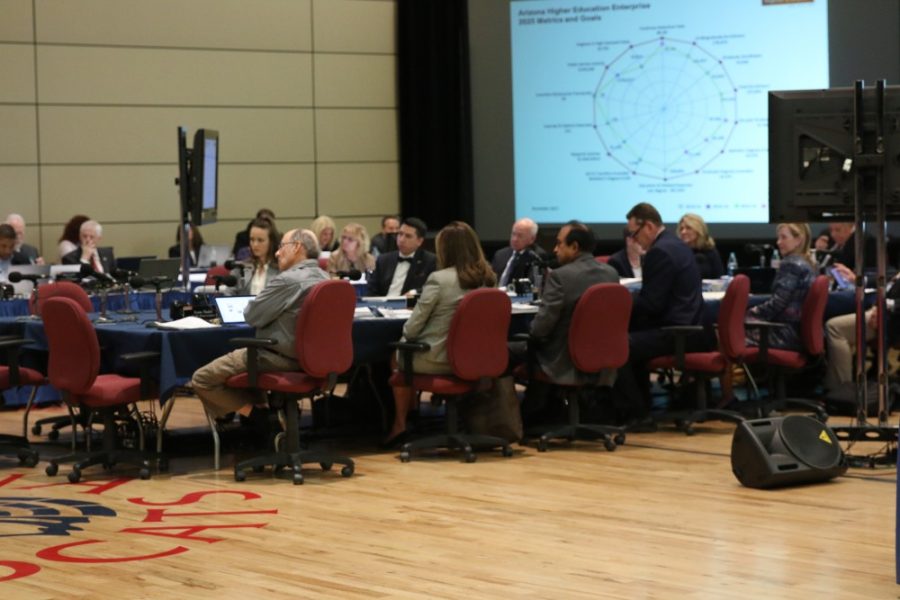With a series of unanimous votes, the Arizona Board of Regents approved a tuition increase, implemented new campus safety policies, and honored retiring president Eileen Klein.
The regents, which are the governing body of the three public Arizona universities and appointed by the governor, convened their final public meetings of the academic term at the University of Arizona, April 5.
While the first days of meetings focused on tuition and fee setting at all three universities, the regents April 6 meeting will include the appointment of five new UA regents’ professors, regent internal elections, and discussion on regent policy.
Here are the standout moments from the regents’ first day on campus:
Tuition and fees
After a long tuition and fee setting process that involved UA President Dr. Robbert Robbins and student voices, the regents voted to increase UA’s base tuition by 2 percent for all incoming students.
“I want to thank those who participated in the thoughtful and collaborative discussions on tuition and fees, our process this year was as smooth as it has gone in recent years,” Robbins said.
For students with the four year tuition guarantee, their tuition will not increase.
Robbins did not recommend the regents increase mandatory fees. He told the regents the additional revenues from the increase will go to hiring additional mental health services and financial aid staff, subsidize childcare for students, and increase merit-based raises to UA faculty and staff.
The regents approved a number of changes to college differential tuition which included eliminating College of Medicine fees and introducing program fees for majors in the College of Agriculture and others.
Read more about the regent’s tuition and fee discussion here.
Safety policy
The regents voted to temporarily implement a new policy to clarify the definition of weapons and dangerous instruments, which are banned on campus.
The policy will be implemented for 90 days and must be renewed at the next regents’ meeting.
Universities must allow a series of Personal Safety Devices on campus and publish a list of approved devices.
“This will allow universities to quickly accommodate changes in technology without the need to amend a statute or board policy,” the regents Board Book read.
Hispanic Serving Institution
The University of Arizona was officially named a Hispanic Serving Institution, making it just the third member of the Association of American Universities to receive full membership.
“This has been a tremendous journey for the university and I would like to recognize Marla Franco who led this effort,” Robbins said.
Hispanic Serving Institutions are public universities where over 25 percent of the student body identify as Hispanic. The university must also show a dedication to educating the Hispanic community.
With this new distinction, the UA will now have access to a plethora of new government grants and funding opportunities.
Athletic coaches’ contracts
After recent high profile athletic departures, the regents voted to approve a number of policy changes regarding the process the universities must traverse to hire new athletic coaches.
“Coaching contracts represent huge expenditures at the universities, our new policy addresses the hiring process in a more comprehensive and consistent way and holds our presidents responsible for student athlete graduation and the program’s legal compliance,” said regent Larry Penley.
Arizona State University President Michael Crow pushed back against the new policy worrying that the requirement to consult the regents before offering coaching contracts may be a detriment to hiring policies, considering the fast passed nature of negotiations.
The regents approved the policy to retain more power over contract negotiations, including adding clauses on the program’s legal compliance, with the understanding an implementation process would be agreed upon with the university president’s moving forward.
Read more about the changes here.
Mineral Museum moving
The regents approved UA’s request to lease the historic Pima County Courthouse to relocate UA’s Gem and Mineral Museum.
The new museum location will bring the Gem and Mineral Museum out of the basement of the Steward Observatory and into the light for the public to enjoy.
“The museum will also be an educational annex for UA students studying mineralogy and gemology,” said Eric Fritz, a research associate in Geosciences.
Read more about the mineral museum tomorrow.
Klein retirement
ABOR President Klein announced she would retire before her contract expired.
The regents voted to name her President Emerita, award her the regents medal, and award her at-risk compensation and her salary. Klein’s tenacity and focus on defending and improving the public universities was applauded by the regents.
“Her accomplishments will continue to serve the state of Arizona going forward,” said regent Bill Ridenour.
Read more about her retirement here.
UA student regent’s final vote
Vianney Careaga, the student regent from UA, cast what will be one of his final official votes as a student regent on campus.
Careaga, a political science and philosophy major, has represented all 180,000 Arizona public university students for the last two years on the board after his appointment by Arizona Governor Doug Ducey. Careaga will be replaced by Norther Arizona University Student Lauren L’Ecuyer.
I was very appreciative of President Robin’s taking into consideration the concerns of student during the UA tuition setting process and the maintenance of the tuition guarantee program,” Careaga said as he voted for UA’s new tuition rate.
DACA and other student voices
During the call to audience, students were able to address the regents with their concerns.
Mira Patel, a UA Deferred Action for Childhood Arrivals recipient, addressed the progress and challenges of DACA students on campus.
“Over the last year, the first scholarship for DACA recipients was created, which students fought for at this meeting last year, and I was able to receive 2000 dollars,” Patel said.
While Patel acknowledged the progress being made, she raised concerns about recent Border Patrol activity on UA’s campus and the lack of a university plan to protect students.
Amidst a Title XI review on campus, President Robbins also highlighted student efforts to raise awareness about sexual assault.
“I am incredibly proud of the student led ‘I Will’ campaign, an effort to raise awareness with sexual assault,” Robbins said. “I took the ‘I Will’ pledge to make a difference.
Legislative Agenda
The regents plan to continue to lobby the state legislature for more state funding, especially for legislative support for their resident-student funding model where the legislature funds half of tuition for in-state students.
The regents also discussed reforming their tuition and fee setting process, opting to examine the possibility of having years where tuition increases are not considered.
“The universities have shown they can do more with less and it is by intent but never at the sacrifice of quality,” said regent Ron Shoopman.
Crow criticized the discussion of tuition and fees as a politicizing the process instead of a making it a discussion of resources. The universities have decreased the cost of graduating a student and the state still refuses to invest in Arizona students to the detriment of the economy.
Crow advocated for pushing for more legislative funding first before examining the tuition and fee setting process.
Check back to the Daily Wildcat tomorrow for continued coverage of the regents on campus.
Follow Randall Eck on Twitter









